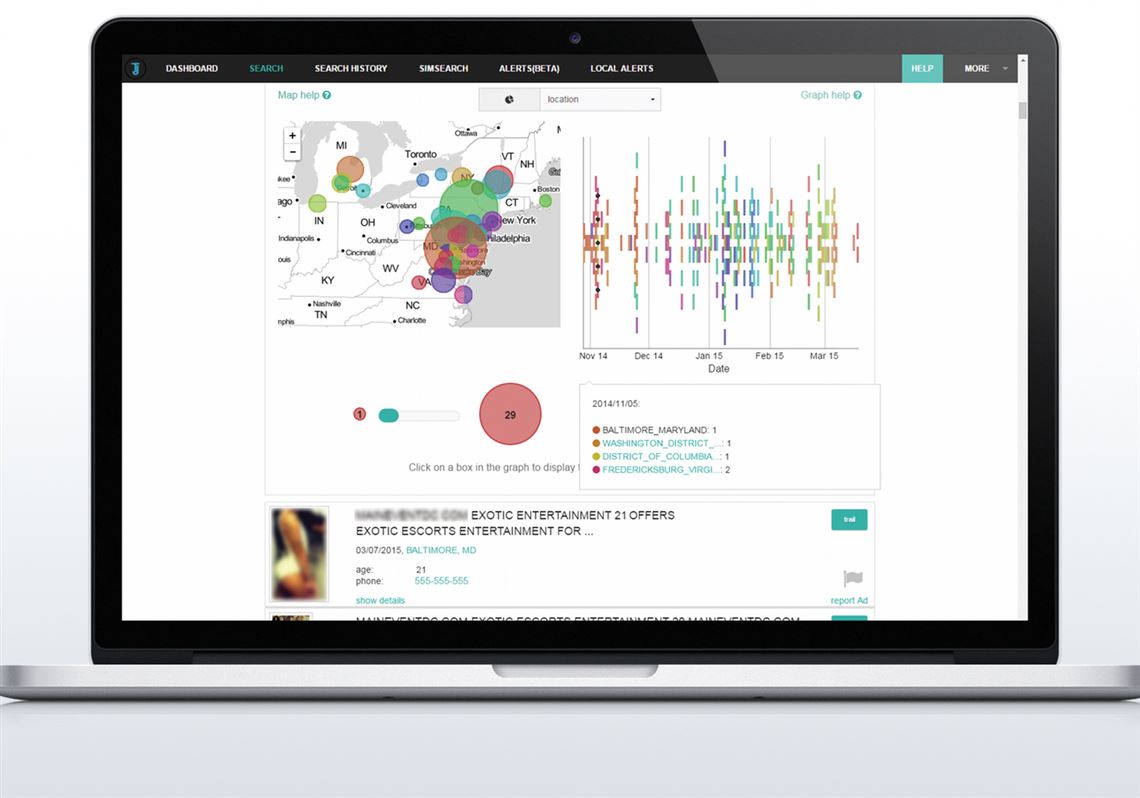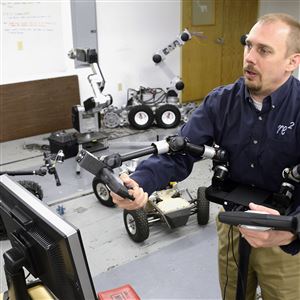Emily Kennedy’s high-tech mission to stop human trafficking began years ago when she was traveling through Serbia, Macedonia and Albania.
Passing through a small town with just one stoplight, peering out the window from the backseat of an old Audi rental, Ms. Kennedy noticed children begging on the road. They came up to the vehicle to wash the windows, slamming up against the door.
“After we passed through, my friend from Eastern Europe said the children were trafficked by Russian mobs to beg on the street and had to meet a daily quota [by gathering] money,” Ms. Kennedy said. “Otherwise they would be punished.”
That image stuck with her.
In 2012, Ms. Kennedy wrote her undergraduate thesis at Carnegie Mellon University. In it, she noted that since the early 2000s, the internet has become a popular tool for human traffickers, particularly in the sex trade, to advertise and sell their victims.
By 2014, she had co-founded Marinus Analytics, a social impact startup on the North Side working to use facial recognition technology to help authorities catch leaders of human trafficking rings.
Catching the bad guys
In January, the FBI took down a ring of sex trafficking operations in the U.S., Canada and Australia.
A federal grand jury in Portland, Ore., indicted six individuals for allegedly running trafficking organizations after a nationwide sting operation turned up a series of massage parlors that illegally recruited women from China to engage in prostitution.
The National Cyber Forensics and Training Alliance — a nonprofit in South Oakland that helps industry, academia and law enforcement identify and mitigate cyber threats — assisted in the case by seizing websites where prostitution services were advertised.
These sex trafficking circles primarily used the website www.supermatchescort.com, according to the U.S. attorney’s office in the District of Oregon. The FBI seized that domain name and about 500 associated ones.
Marinus Analytics claims that it generated the original lead for this case with help from Traffic Jam, its facial recognition tool.
The NCFTA did not respond to requests for comment to confirm that, though Matt LaVigna, president and CEO of the alliance, did note in a Marinus press release that working with the private sector can certainly aid authorities.
“This case demonstrates that we are making an impact by leveraging public-private relationships and innovation in our community,” he said, according to the release. “It is especially gratifying when we can combine these resources to assist law enforcement in disrupting such a heinous crime.”
A screenshot of a website that hosted prostitution services for a ring of sex trafficking organizations has been seized by the FBI. Upon searching for its domain name — and any others associated with the website — this warning pops up. (Post-Gazette)
Needle in a haystack
Cara Jones, CEO of Marinus, claims the company’s Traffic Jam tool can decrease investigative time by 50 percent while helping law enforcement find victim matches with an 88 percent success rate.
Marinus has collected millions of publicly available images from websites where prostitution services are advertised. These become the data points for its facial recognition platform, powered by artificial intelligence.
Say there is a photo of a woman who has gone missing recently, and there’s a suspicion that human trafficking may be involved. Through Traffic Jam, authorities can upload an image of that person and look for similarities between the original photo and online escort ads.
“The software connects and finds needles in the haystack,” Ms. Jones explained. “Through computer vision, we can connect content on these sites, based on the face or broader similarity in the background or foreground.”
Once matches are found, police can see the phone numbers associated with the ads as well as the location. The hope is that the technology will eventually lead authorities to a recent ad and associated location to find and save the victim.
Since Marinus is a social impact company, it’s not raising much money — almost fully relying on grants from the likes of the Alexandria, Va.-based National Science Foundation, which has awarded the startup $909,894 to date.
That cash will help Marinus develop solutions to problems raised by its law enforcement clients, according to the NSF grant award, issued April 1, 2017.
Specifically, Marinus will expand on its machine learning tech to find hidden escort ads online that may assist investigations.
That research will be integrated into a software product that can provide real-time, easily accessible information to law enforcement that will hopefully result in the rescue of sex trafficking victims.
The project is expected to end Sept. 30 of this year.
Not just a stereotype
The human trafficking market is worth upward of $100 billion each year, according to the International Labour Organization, a Geneva, Switzerland-based agency of the United Nations, tasked with advancing social justice.
According to the National Human Trafficking Hotline, 127 cases of human trafficking were reported last year in Pennsylvania. Of those, 23 originated in illegal spas and massage parlors. Of course, not all trafficking involves prostitution — in other cases, victims are exploited for work in hair and nail salons, agriculture, hotel services and more.
Last week, Attorney General Josh Shapiro announced criminal charges against four people accused of being involved in human trafficking operations conducted out of Allegheny and Westmoreland counties.
Meanwhile, the March controversy over Robert Kraft, owner of the New England Patriots, has brought sex trafficking cases into the national spotlight.
Mr. Kraft, 77, has been accused of soliciting prostitution after being caught at the Orchids of Asia Day Spa in Jupiter, Fla., near his home in Palm Beach. Two dozen others were also implicated.
It’s unclear if facial recognition technology was used to aid detectives in either of these cases.
Good intentions but pushback
Even when used with the best of intentions, facial recognition technology is not without its detractors.
In January, 90 advocacy groups penned a letter to tech companies like Google, Microsoft and Amazon, asking them not to sell facial recognition technology to the government.
That included the New York City-based American Civil Liberties Union. In July, Jacob Snow, an attorney with the ACLU of Northern California, wrote in a blog post that Amazon’s facial recognition software — called “Rekognition” — falsely matched 28 members of Congress with mugshots.
Yet it’s still being used. Marinus uses Rekognition in its system.
The startup sells its services to police agencies through a monthly subscription service, though Ms. Kennedy declined to mention specific financials.
And Marinus Analytics, which employs six, is not the only firm using facial recognition to bust sex traffickers.
In Atlanta, a startup called Trust Stamp allows families to upload photos of missing persons to find possible matches on surveillance feeds.
AxxonSoft, a Fremont, Calif.-based software company, uses facial recognition in its Safe City project across the globe. The tech can pick out a face from live videos feeds, triggering an alarm if the match is very similar to a missing person.
Ms. Kennedy defends her company’s use of the technology.
“When people think of social impact companies, they think [about] some company that gives products to people in need,” Ms. Kennedy said. “Our contribution is really about reaching underserved populations that need technology and AI that wouldn’t otherwise get an opportunity.”
If you suspect you’ve come across human trafficking victims, you can call the National Human Trafficking Hotline toll-free at 1-888-373-7888. You can also text “BeFree” to 233733.
Courtey Linder:clinder@post-gazette.com or 412-263-1707. Twitter: @LinderPG.
First Published: April 4, 2019, 12:00 p.m.
Updated: April 4, 2019, 12:41 p.m.


















